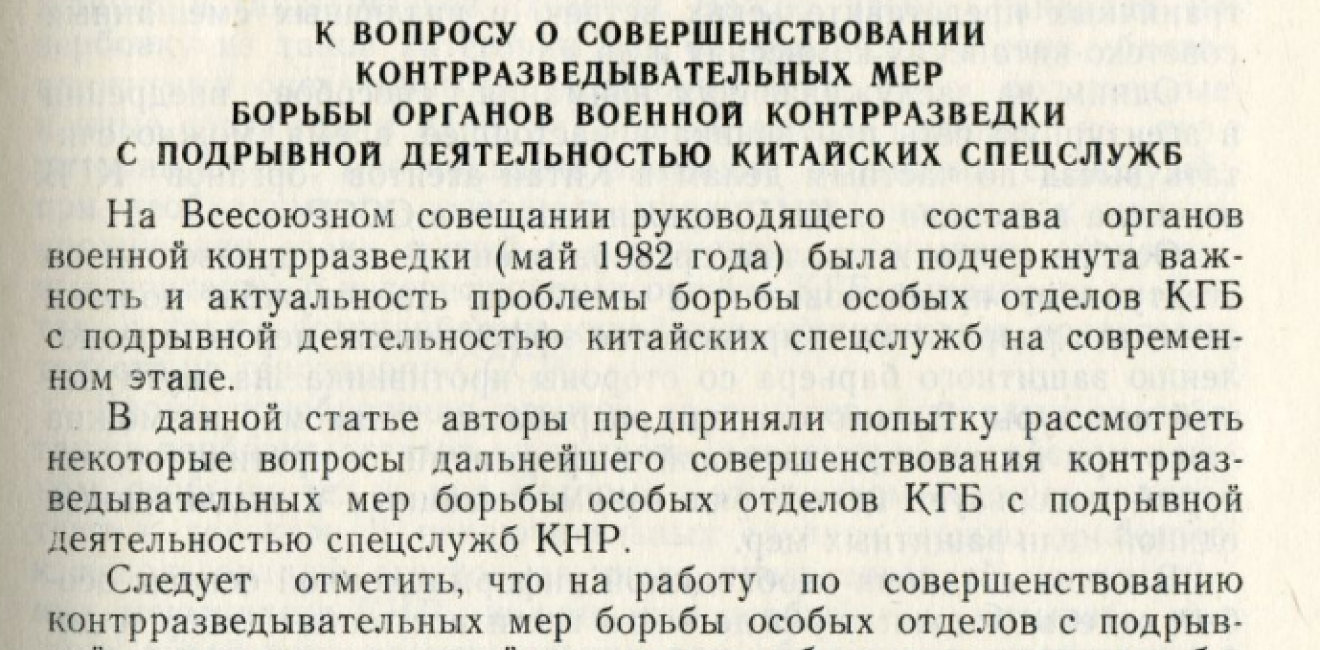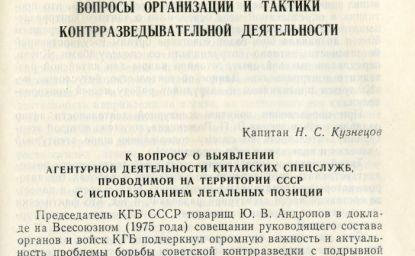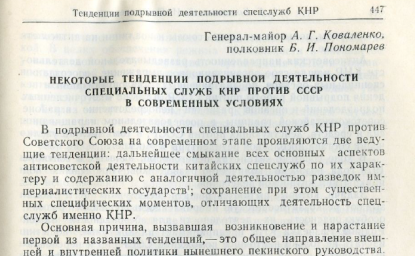An article with a long-winded title, a ubiquitous characteristic of the KGB publications, “To the Question of the Improvement of Counterintelligence Measures in the Combat of Military Counterintelligence Against the Subversive Activities of the Chinese Special Services” appeared in Volume 28/29 of Papers of the Higher School of the KGB in 1983.[1]
The article was co-authored by two KGB lieutenant colonels, A. A. Karyaev and Yu. A. Penkov, both of whom also the academic degree of a candidate of legal sciences (Soviet/Russian equivalent of the PhD). This makes it reasonable to assume that they were instructors at the Higher School of the KGB in Moscow, teaching courses related to Chinese intelligence and counterintelligence operations with the special focus on military counterintelligence.
Karyaev should be a familiar name to the readers of my previous articles. I covered his 1978 article “Some Questions Regarding the Subversive Activities of Chinese Special Services Directed Against the Military Forces of the USSR” in Part III of the series.
In 1978, Karyaev was still a major who was professionally affiliated with the Third Directorate of the KGB (military counterintelligence). By 1983, perhaps due to his writing and research abilities, he appears to have been transferred from active service in the field to educating the next generation of KGB officers. He might have been brought to the Higher School in order to strengthen their counterintelligence training program targeting the People’s Republic of China. For instance, he and his co-author Penkov mention that by 1983, four generations of KGB counterintelligence China specialists had already graduated from the Higher School’s Faculty No. 3. This indicates that the entire program became operational in the mid-1970s.
The driving force behind this program (and other China-related initiatives) at the KGB in the 1970s and early 1980s seems to have been the belief of the KGB leadership that they were falling behind in the Soviet-Chinese spy wars. For instance, Karyaev and Penkov point out that a top level KGB leadership meeting held in May 1981 concluded that the KGB did not have “a sufficient number of agents” in the Chinese security services. They also refer to the statement of the KGB deputy chairman Vladimir Pirozhkov at the leadership meeting of the Russian Far East branches of the KGB in May 1980 saying that much more had to be done by the KGB counterintelligence to insure the protection of the Soviet Union against the Chinese state security operations on its territory. Especially important in this respect was the emphasis on recruiting more agents who could infiltrate Chinese state institutions and agencies and report on the intentions and capabilities from the inside.
How to do so in a consistently successful manner is one of the main issues that Karyaev and Penkov address in their article. They contextualize their discussion by stating that the infiltration operations against the People’s Republic of China are complicated because the Chinese adversaries are “well familiar with [KGB] forms and methods of counterintelligence activities.” In other words, since the Chinese services know what to expect from the KGB based on their allied-type interactions in the not too distant past, it is very difficult to deceive them using dangles and other typical counterintelligence tactics.
In addition, according to Karyaev and Penkov, there are cultural complexities that need to be kept in mind when trying to recruit agents among the ethnic (Han) Chinese.[2] They point to what they perceive to be the Chinese “national characteristics,” such as “submissiveness toward authorities, sociability with compatriots, and mutual surveillance,” which can greatly impact the recruitment tactics. In practice, this means, for instance, that making the recruitment period too long is not advisable since it increases the possibility of unwanted exposure. However, at the same time, trying to do it quickly can also backfire because “as is well known,” write Karyaev and Penkov, “the Chinese do not like the haste.” Moreover, if there is no personal rapport between the KGB recruiter and the Chinese agent being recruited, the latter may acquiesce externally but rebel internally, which inevitably leads to failure.
In this context, Karyaev and Penkov refer to an article by another KGB officer N. S. Kuznetsov titled “Some Specific Features in the Recruitment of the Agents Among Those in Contact with the Individuals of Chinese Ethnicity, Checked or Cultivated Due to Being Suspected of Espionage.”[3] Unfortunately, the volume of the Papers of the Higher School of the KGB containing this article has never been publicly released.[4]
In terms of the rationale for recruitment, Karyaev and Penkov indicate that, unless the given individual serves in the Soviet military, ideological or political factors will not work. In their experience, “almost no ethnic Chinese fully accepted Soviet ideology” and therefore other motivational factors must be found, preferably conferring personal or material benefits. For instance, they point out that those Chinese immigrants who do not have Soviet citizenship generally agree to being recruited by the KGB military counterintelligence in order to obtain it.
Moreover, Karyaev and Penkov advise against using blackmail as the main tool of recruitment. They claim that this kind of “complete dependence” of the recruited individual on the recruiter will make him or her resentful and eager to cut ties and escape at the earliest opportunity. At the same time, however, they stress the importance of “saving face” in Chinese culture. In this way, they imply that the threat of blackmail should not be eliminated altogether from the toolbox of the KGB military counterintelligence recruiter. There may be certain situations when blackmail might make a difference because the fear of being shamed in front of the community might propel the recruited individuals to do what they were asked to.
Regarding the individuals doing the recruiting, Karyaev and Penkov recommend the use of recruiters who come from the same region of China as the individual being recruited. They emphasize the sensitivity of the Chinese to regional cultural and other differences and even cite several observations on how the Chinese from the northern regions perceive the Chinese from the southern regions and vice versa from a Soviet book published in Almaty, Kazakhstan in 1976.[5] For example, according to the author of that book, L. L. Bessarab, the northern Chinese consider the southerners to be short-tempered and untrustworthy, while the southerners consider those from the north stubborn and conservative. Karyaev and Penkov claim that the KGB interactions with the Chinese from different regions proved the accuracy of these observations.
Among the most favorable places for recruitment, Karyaev and Penkov mention the regular Beijing-Moscow railway service and the Chinese immigrant communities along the Soviet border regions or near facilities of strategic or military significance. Not surprisingly, they indicate that the most promising venue has turned out to be the recruitment of those in the Chinese immigrant community who often travel to China to visit family members. Obviously, at the same time, those individuals find themselves under the most probing surveillance by the Chinese security services. According to Karyaev and Penkov, this all-encompassing surveillance is something that the KGB counterintelligence training programs have to incorporate as one of their axiomatic guiding principles when dealing with China.
In order to improve the existing KGB counterintelligence efforts and activities against the People’s Republic of China, Karyaev and Penkov make several substantive recommendations. First, they insist on the need to improve and strengthen the channels of communication between the regionally-based KGB counterintelligence branches and the units of the KGB military counterintelligence also known as the special departments (особые отделы). They strongly criticize the past practices of authority fragmentation, provincialism, and operational duplication. Secondly, they advocate the creation of centralized databases and shared informational resources. Thirdly, they propose the establishment of the sectional analytical centers devoted to China in Soviet border regions. These centers, which would include active officers from the different counterintelligence branches of the KGB (the Second Chief Directorate, the Third Chief Directorate, the Fifth Chief Directorate) as well as the China specialists trained at the Higher School, would accumulate and analyze the relevant counterintelligence information and distribute their assessments and estimates to the KGB leadership for further action.
Moreover, in order to test whether the newly established measures and practices work the way they were intended to, Karyaev and Penkov suggest running an occasional “as if” exercise or experiment where the subversive activities of Chinese intelligence and counterintelligence services would be simulated under the “artificial conditions.” This kind of deceptive role playing has historically been an important part of the KGB counterintelligence profile but, in these cases, it would be employed against their own side. According to Karyaev and Penkov, to do so would be ethically justified because the lessons derived from the ways in which the existing institutional mechanisms respond to the fabricated threat are crucial for the improvement of their functioning.
The question, however, remains as to whether the proposals made by Karayev and Penkov were implemented in practice and if so, to what extent they improved the effectiveness of KGB counterintelligence in general and KGB military counterintelligence in particular regarding the challenges posed by the operations of the Chinese security services. This is the task for my future research as I continue to analyze the articles published in Papers of the Higher School of the KGB.
[1] Candidate of Legal Sciences, Lieutenant Colonel A. A. Karyaev and Candidate of Legal Sciences, Lieutenant Colonel Iu. A. Penkov, “К вопросу о совершенствовании контрразведывательных мер борьбы органов военной контрразведки с подрывной деятельностью китайских спецслужб [To the Question of the Improvement of Counterintelligence Measures in the Combat of Military Counterintelligence Against the Subversive Activities of the Chinese Special Services,” Труды Высшей Школы КГБ [Papers of the KGB Higher School] Vol. 28-29 (1983), pp. 235-244.
[2] Karyaev and Penkov caution that recruiting agents among the national minorities living in China should be done only in “exceptional cases” because those individuals, due to their ethnicity, will be unlikely to be able to penetrate into the Chinese state institutions dominated by the Han majority.
[3] N. S. Kuznetsov, “Некоторые особенности вербовки агентов из числа связей лиц китайского происхождения, проверяемых или разрабатываемых по подозрению в шпионаж [Some Special Features in the Recruitment of the Agents Among Those in Contact with the Individuals of Chinese Ethnicity, Checked or Cultivated Due to Being Suspected of Espionage,” Papers of the KGB Higher School, Vol. 17 (1978).
[4] Note that I have analyzed Kuznetsov’s 1980 article titled “Toward the Question of the Detection of the Activities of Chinese Intelligence Services Using the Legal Cover on the Territory of the USSR” in Part I of the series, https://www.wilsoncenter.org/blog-post/soviet-chinese-spy-wars-1970s-what-kgb-counterintelligence-knew-part-i.
[5] L. L. Bessarab. Некоторые особенности психологии китайцев. Лекция [Some Special Features in the Psychology of the Chinese. A Lecture], Almaty: KUROS, 1976.







